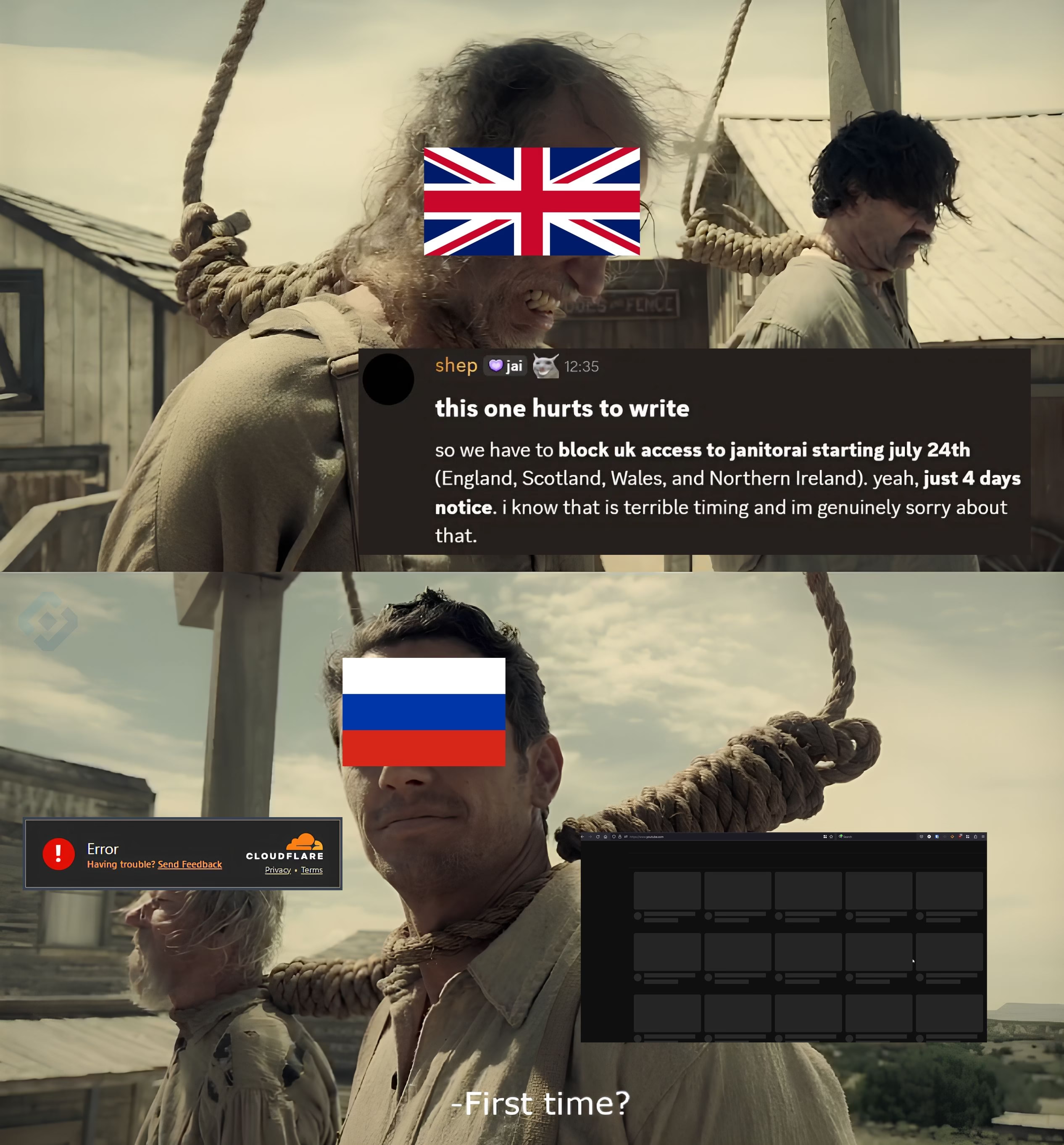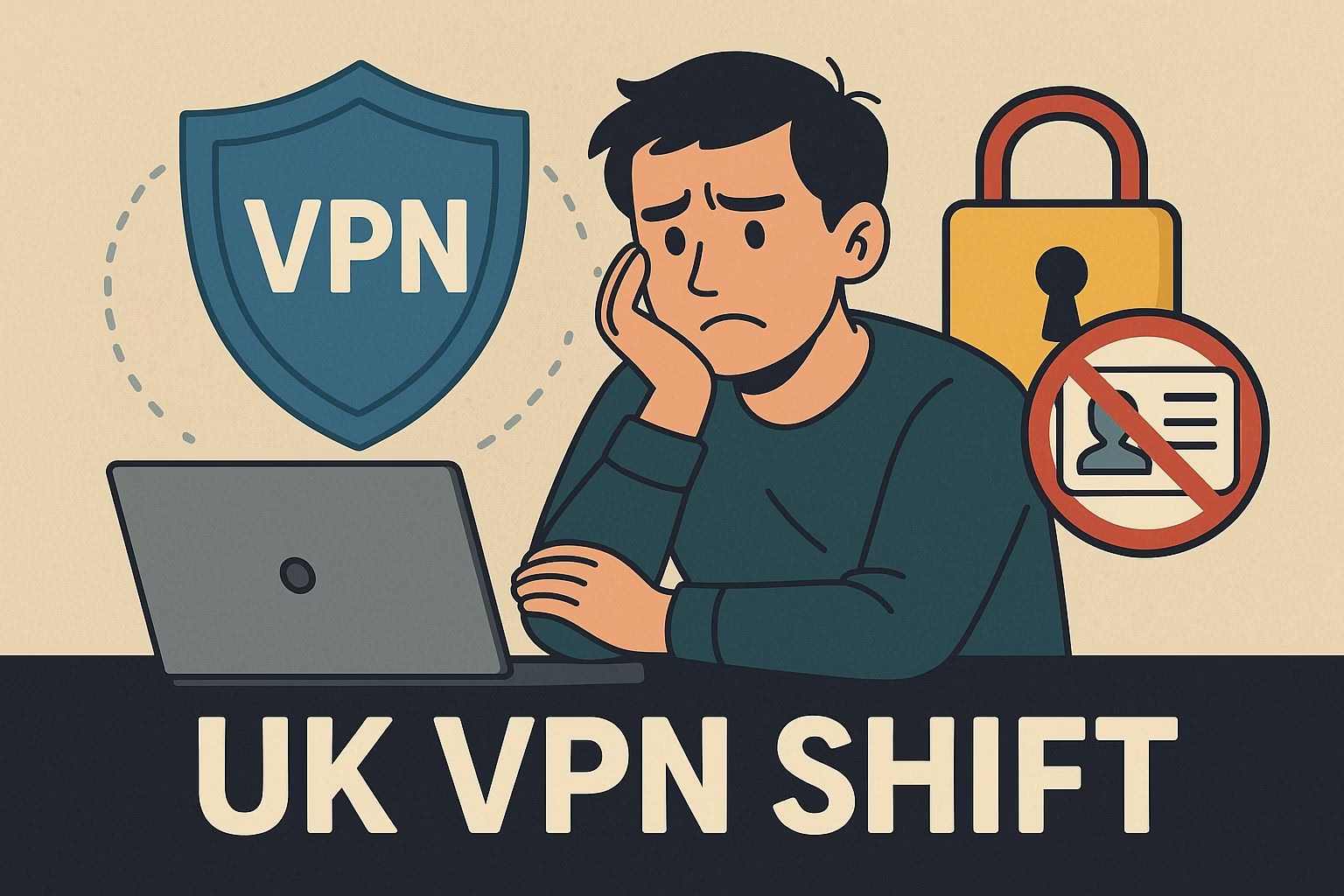UK Janitor AI Users Turn to VPNs as Government Restrictions Kick In
UK internet users are waking up to the reality of tighter online controls, and Janitor AI has landed right in the middle of it.
The Online Safety Act is already pushing people toward VPNs, not for piracy or streaming, but just to keep chatting with AI bots without handing over their personal ID.
For many, the idea of uploading identification to a website like Janitor AI feels intrusive and risky.
Other countries have tried similar measures before. Spain once floated a bizarre “corn passport” scheme that limited viewing time and required in-person renewals.
It collapsed under its own impracticality, but the UK’s approach is more polished and more likely to stick around. People who never thought they would need a VPN are now looking for free options like Proton VPN, despite slower speeds, just to keep their usual AI chats going.
The bigger concern is that the UK might be setting an example other governments will copy. What starts as an ID check for certain sites could easily expand into a broader system of internet control.
In places like Russia, Belarus, and Cuba, VPNs are already essential for everyday browsing.
For UK users, this shift marks the start of a learning curve and possibly the loss of an open, frictionless internet they have taken for granted.

Why UK Users Are Suddenly Interested in VPNs
For years, most people in the UK saw VPNs as tools for niche needs. Some used them for streaming region-locked shows, others for privacy while using public Wi-Fi, and a smaller group for torrenting.
That changed the moment Janitor AI required ID verification for access, following the UK government’s Online Safety Act.
Overnight, VPNs became the simplest workaround to keep chatting with AI bots without sharing personal documents.
The conversation online shows a mix of frustration and surprise. Many never imagined they would need to bypass restrictions for something as harmless as an AI chatbot.
Others, who had never bothered to learn how VPNs work, are suddenly downloading free options like Proton VPN or considering paid services to get better speeds.
This shift is not about avoiding law enforcement but about maintaining digital privacy for everyday interactions.
Some users are already looking beyond the free choices. Services with faster speeds and better server coverage, such as Surfshark VPN, are mentioned in passing in these discussions.
For someone in the UK who wants a smooth connection without constant switching between servers, that extra investment could make the whole process far less frustrating.
How Other Countries Have Handled Similar Restrictions
The UK is not the first to limit online content through identity checks or site bans. Spain’s proposed “porn passport” drew heavy criticism for being both invasive and impractical.
Users were supposed to get time-limited access and physically renew their credentials, creating awkward and unnecessary public encounters.
It never went into effect, but the idea revealed how far some governments are willing to go in controlling digital content.
In Russia, Belarus, and Cuba, VPNs are already a daily necessity. Users there often leave them on permanently, as even non-political websites can be blocked.
This constant dependence has shaped an entire culture of bypassing digital barriers. For them, changing a VPN server is as routine as checking email.
What makes the UK’s situation unique is the scale of users being affected all at once.
Instead of targeting a specific type of website, the rules now spill over into AI tools, gaming platforms, and potentially more in the future.
This is why many worry that what starts with Janitor AI could spread into other corners of the internet that people once assumed would remain free to access.
VPN Performance Concerns for Janitor AI Users

One of the first things new VPN users in the UK are noticing is speed loss. Free VPNs, like Proton VPN, are often mentioned as secure and reliable for basic privacy needs, but the trade-off is slower browsing.
This slowdown can be frustrating, especially when using a chat platform like Janitor AI that relies on constant back-and-forth requests to the server.
Conversations can lag, and error messages may pop up if the VPN server location is also restricted.
Some users report that even when a VPN works for accessing Janitor AI, certain servers cause the platform to block chats or prevent new conversations from starting.
This creates a trial-and-error process, where users must keep switching server locations until they find one that works. It is a small but persistent inconvenience, especially for people new to VPN use.
The learning curve is not just technical. Many in the UK are still adjusting to the idea that an everyday online activity now requires an additional layer of digital disguise.
For long-time VPN users in other countries, these hiccups are normal. For those in the UK, it feels like a sudden downgrade from the frictionless internet they once had.
The Global Shift Toward Internet Restrictions
What is happening in the UK is part of a larger global trend. Governments worldwide are experimenting with ways to monitor and control internet access.
Sometimes it is framed as protecting children, other times as enforcing national laws or safeguarding cultural norms.
The result, however, is often the same: users lose direct access to sites and services unless they comply with identification checks or other gatekeeping measures.
The UK’s approach with Janitor AI has drawn attention because it targets a type of service many considered harmless.
If ID verification becomes the norm for AI chat platforms, other countries may see this as a model to copy.
The conversation is no longer about one platform or one law; it is about the precedent being set for how much control governments can exert over digital spaces.
This is why VPN adoption tends to spike whenever new restrictions appear. In Belarus, Russia, and Cuba, constant filtering has made VPNs a default part of internet use.
If the UK continues on its current path, it may follow the same trajectory, where bypass tools become not just common but necessary for basic online freedom.
Key Takeaways for UK Janitor AI Users
The shift toward VPN use in the UK is no longer a fringe movement. Janitor AI’s ID requirements, backed by the Online Safety Act, have pushed regular internet users into territory they never expected to navigate.
What was once a niche tool for tech enthusiasts is now becoming part of the average user’s digital toolkit.
The initial adjustment will come with frustrations. Free VPNs may offer a quick fix but often at the cost of slower speeds and occasional service blocks.
Paid services can deliver smoother performance, but the real issue is not the tool itself — it is the growing need to use one in the first place.
For many, the decision to adopt a VPN is less about convenience and more about defending privacy.
Other countries provide a clear warning. Once restrictions are in place, they rarely roll back without significant pushback.
The UK is entering a phase where bypassing internet controls could become second nature.
Whether it starts with Janitor AI or expands to other platforms, the underlying message is clear: online freedom in the UK may soon depend on your willingness to adapt and learn new ways to access the content you value.
